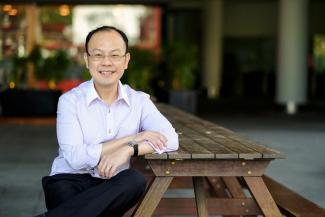
SMU Assistant Professor Jimmy Lee studies how a company’s senior management team can contribute to good corporate governance.

Photo Credit: Cyril Ng
By Sim Shuzhen
SMU Office of Research – The accounting fraud scandals that bankrupted Enron and WorldCom in 2001 and 2002 affected millions of employees and shareholders, eroded public confidence in corporations, and underscored the crucial role of good corporate governance in maintaining an efficient, honest financial system.
In well-governed companies, a sense of accountability and a clear understanding of roles and responsibilities keep operations running smoothly, making it easier to attract investors to finance further growth. Corporate governance mechanisms are often broadly divided into two categories: mechanisms internal to the company, such as the board of directors and the senior management team, and mechanisms external to the company, including shareholders, creditors, customers and suppliers.
The board of directors, to whom a company’s senior management is accountable, is considered a key internal governance mechanism. But much less is known about corporate governance mechanisms that operate closer to the ground, deeper within the company itself.
“This lack of knowledge is an important omission because control is not just imposed from the top-down or from the outside, but also from the bottom-up,” says Assistant Professor Jimmy Lee from the Singapore Management University (SMU) School of Accountancy. Professor Lee is particularly interested in checks and balances that are imposed by a company’s senior management team itself, and in whether or not these contribute to the effectiveness of overall corporate governance.
Checks and balances from the bottom up
To address this gap in the literature, Professor Lee is working with Professors Cheng Qiang of SMU and Terry Shevlin of the University of California, Irvine to examine how key subordinate officials (defined as the top five highest-paid executives after the CEO) can influence the extent of real earnings management in US companies.
Real earnings management – the use of accounting techniques that deviate from normal business practices to present a better financial position to investors –often occupies a grey area between allowable practices, and manipulation or fraud.
Professor Lee and his colleagues obtained extensive archival data from S&P Capital IQ, a financial information provider which compiles data on senior management teams from annual proxy statements filed by S&P 1500 firms. The team used the number of years to retirement as an indicator of horizon incentives – how likely executives are to make decisions that are good for the company in the long-term – and the relative annual compensation to the CEO’s compensation as a measure of an executive’s influence within the company.
They found that as key subordinate executives’ horizon and influence increased, the extent of real earnings management in the company decreased. This suggests that members of the senior management have both the incentive and the ability to exert effective corporate governance.
They also found that internal governance was more effective in companies where key subordinate executives make bigger contributions, for example in technologically complex, research and development-intensive industries.
On the other hand, internal governance was less effective when companies had great incentives to meet or exceed earning benchmarks – for example, if the company was already in distress, or would be engaging in significant financing activities in the near future.
Importantly, the study showed that in addition to well-established internal corporate governance mechanisms such as the board of directors, members of the senior management can also influence the quality of financial reporting by providing checks and balances from within the company. A bottom-up approach, therefore, also helps.
Distinguishing between correlation and causality
A challenge for Professor Lee, whose research mainly relies on empirical data, is separating correlation from causation.
For example, if the team observes that companies with stronger corporate governance mechanisms also do better financially, they cannot simply conclude that stronger governance leads to better financial performance. The reverse may instead be true – better-performing companies may prefer to have stronger corporate governance.
Other hidden variables could also be behind the association – for example, companies that start off richer could prefer stronger corporate governance, and these better-endowed firms also do better financially.
“Of course, we would like to draw stronger conclusions from our research, but this is not easily achievable in empirical studies,” says Professor Lee. He and his colleagues try to find innovative ways to make stronger inferences from their studies. One method is to take advantage of natural experiments – a new regulation that affects some companies but not others, for example – to strengthen the case for causality.
A gifted and practical teacher
“I am currently still relatively young in my academic career, and am trying to establish expertise and reputation in my research area,” says Professor Lee, who joined SMU in 2011, after earning his PhD at Northwestern University in the United States.
This self-professed newbie, however, has already been recognised by the university for his ability to engage students. In 2013, he bagged the Most Outstanding Newcomer Teaching Award from the SMU School of Accountancy, and was also named Most Promising Teacher at the SMU Teaching Excellence Awards.
Professor Lee teaches undergraduate management accounting – a required course – to non-accounting majors. This, he says, is a challenging task. “I acknowledge that my students are unlikely to be accountants in the future,” he says. “Therefore, I tailor my class to focus on how cost accounting can be relevant to their future careers as business managers.”
Outside of undergraduate accounting, Professor Lee’s natural affinity for teaching also spills over into his own area of research. “Once I am better established, I hope to mentor and impart my knowledge and expertise to junior colleagues and doctoral students,” he says.